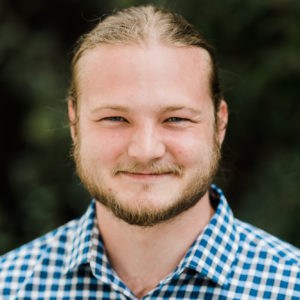Where did you grow up and go to college?
Richmond, Virginia. I earned a bachelor’s and a master’s at Virginia Tech, then did some Ph.D. work at the University of Massachusetts Amherst.
What did you study?
Philosophy. In undergrad, I also had a jazz minor.
Why philosophy?
I enrolled in college with the goal of studying the philosophy of science and the philosophy of math. At the time, at that age, I really trusted the scientific method. I still do. I was curious about how science works. What are the best ways to learn about the world? What’s the right way to reason, the right way to learn? Since then, I’ve always wanted to teach philosophy to children. If philosophy is the right way to learn, then it’s something we need to teach kids.
How did you come to teach at Qualia?
I was looking for schools that taught philosophy to younger people, but not many schools had this built into their curriculum. I convinced some schools to do week-long philosophy lessons and thought experiments, but Qualia was one of the only schools in the United States that was prioritizing philosophy as part of their curriculum. They reached out to me, and I was thrilled when they found me. It was a perfect match.
What other subjects do you teach?
Aside from philosophy and Great Ideas, I teach band and history.
How did you become inspired to teach?
I am really interested in game-based learning, which is a way to allow students to have an experience-based learning. On the one hand, we can discuss highly abstract issues of ethics, but I think it’s far better for younger students to live through or play through a game, where they can feel the impact and significance of their decisions. The game provides a safe space to explore and experience those ethical choices.
If you could go back and learn or do anything, what would it be?
I wish that I had learned philosophy at a younger age, and I would like to go back and learn more musical instruments. That has been such an important part of my life.
Who is your favorite philosopher?
I’m inspired by the way Socrates taught his students. He is famous for question-driven teaching. Instead of delivering lectures, Socrates was known for asking students to explain themselves. I’m really inspired by that method, treating education as a collaborative process.
What has been one of your favorite moments at Qualia?
We played a school-wide fire simulation game. Its central themes were the nature of communication, the nature of trust, and how to parse out true information from false information online. It was a good way to do a game-based learning exercise that helped all of our students.
What do you like to do when you have free time?
I play a lot of Dungeons & Dragons and music.
What is an interesting fact about you?
I was very, very lucky as a 16 year old to play on-stage with pop singer Jason Mraz. I made a piano arrangement for one of his songs, and he liked it so much that he wanted me to join him for some tour dates. The largest crowd I played in front of was about 20,000 people
How are you different now from a few years ago?
When I entered into philosophy, I was wondering what is the right way to think about the world, and I was convinced there was a right way and I had to go learn it. Now I’m a lot more puzzled. I’ve been more skeptical over time but also a lot more curious, maybe not so convinced that getting to the nature of truth is so easy.
What has been unique about teaching at Qualia?
The small class size allows me to really know the students. I learn what they’re curious about and adjust the class structure to them. It’s a constant dynamic exchange, and that’s really exciting. Also, we trust younger people’s capacity to learn and apply critical thinking more than other schools. It’s not about blind faith. We take kids seriously. We take their contributions at face value. We don’t say they ought to be interested in something else. We meet them where they are and develop out from there.

